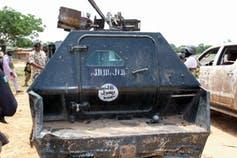The Nigerian government announced that it had released about 1,400 Boko Haram suspects. The reason given was they had repented and were to be re-integrated into society. The government said the releases – which happened in three tranches – were part of its four-year old de-radicalisation programme called .
The announcement generated a lot of angst. Opposition leaders , as did fighting the terrorists.
These reactions mask a fundamental challenge facing governments in conflict situations: how does it deal with defectors? Simply executing combatants, or detaining them indefinitely, aren’t viable options. De-radicalisation and re-integration programmes therefore become unavoidable.
As several commentators on the Boko Haram conflict have repeatedly maintained, such as the , a purely military solution won’t defeat the group.
Generally is understood to involve having people with extreme and violent religious or political ideologies adopt more moderate and non-violent views.
The approach is predicated on the assumption that terrorists, and others with extremist views, can be engaged in a way that can reduce their risk of re-offending.
But there are a number of questions that ‘de-radicalisation’ and ‘re-integration’ programmes raise. These include: is it possible to screen the combatants well enough to measure what level of threat they pose? This is a problem in a country like Nigeria where the basis of selecting those who are being released isn’t transparent. For example, there are allegations that criminal elements in the military have with Boko Haram to secure the release of unrepentant terrorists.
Another question that’s raised is: how can we ensure that the ‘former terrorists’, if re-integrated into the society, do not end up radicalising others in the community, or becoming spies to their former terrorist masters?
And is it fair to rehabilitate the combatants without also rehabilitating their victims?
Most countries faced with violent extremism and terrorism have adopted one form or another of de-radicalisation programmes. Whether they have worked or not is hard to judge because assessments are very often made by people responsible for the programmes. But one thing is clear: governments don’t have many viable alternatives.
Nigeria’s programmes
Nigeria has three main de-radicalisation programmes. One is located in Kuje prison, Abuja, and was set up by the Nigerian government in 2014.
Participants are combatants convicted of violent extremist offences and inmates awaiting trial. The aim of the programme is to combat religious ideology and offer vocational training as a prelude to re-integrating them into communities.
There is also the Yellow Ribbon Initiative which is located in communities in Borno State, in the epicentre of the Boko Haram insurgency in the north of the country.
This is organised by a not for profit organisation, the . It was set up in 2017 and targets women, children and young people associated with Boko Haram.
The third is , which was set up in 2016 by the government. It targets Boko Haram combatants who have surrendered. This approach targets three key issues: religious ideology, structural or political grievances and post-conflict trauma.
The project engages to work with those in the programme on religion.
Participants are also offered training in rudimentary vocational skills. And they are offered therapy to overcome the trauma they faced as members of Boko Haram.
























![National Population Commission (NPC) Recruitment 2023 [Apply Now]](https://www3.illuminaija.com/wp-content/uploads/2023/03/Beware-of-Fake-Census-Ad-hoc-Recruitment-Link-350x250.jpeg)